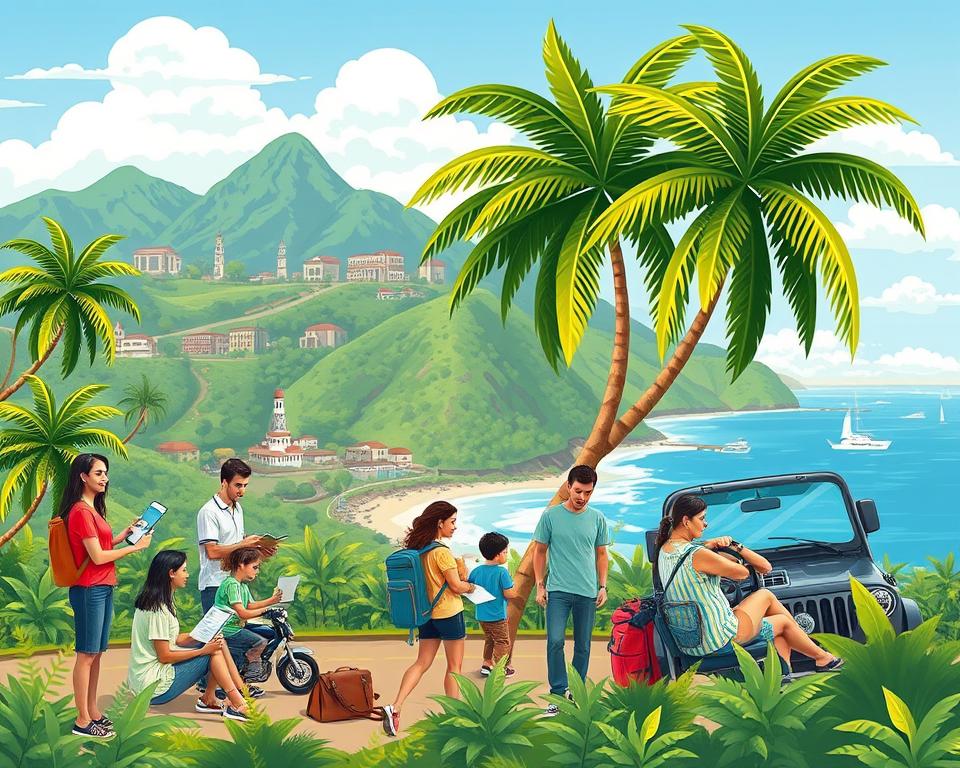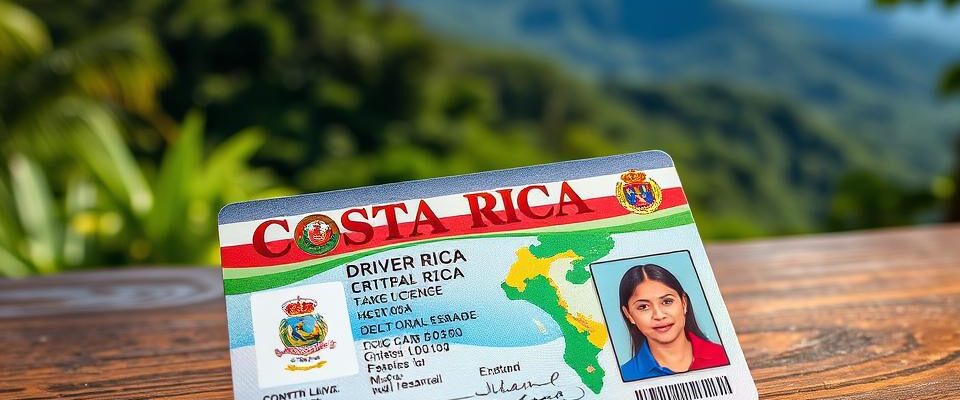Expats: How to Legally Get a Driver’s License in Costa Rica
Imagine living in Costa Rica’s vibrant lifestyle, but then you wonder: can expats get a driver’s license here? Or are they stuck using public transport? For expats wanting to explore Costa Rica’s beautiful landscapes and beaches, getting a driving license is key. The process might seem tough, but knowing the steps can make it easier.
This article will guide you through the legal ways for expats to get a Costa Rican driving license. You’ll learn about the residency requirements and the homologation steps. It’s all you need to know about getting a driving license in Costa Rica as an expat.
Key Takeaways
- Only legal residents and citizens can get a Costa Rican driver’s license; tourists can’t.
- Being a resident in Costa Rica makes getting a license faster, without a three-month wait.
- The appointment for homologation is at COSEVI, with varying wait times.
- You need a medical certificate for the license, valid for 180 days.
- The homologation process takes about 40 minutes, but you’ll need more documents.
- You might need official translations if your documents aren’t in Spanish, which costs more.
Understanding Residency Requirements for a Costa Rican Driver’s License
To get a driver’s license in Costa Rica, expats must know the residency rules. The rules for getting a driver’s license in Costa Rica depend on your residency status. Only residents and citizens can get a driver’s license, so understanding the residency process is key.
Temporary and Permanent Residency Options
Expats can choose between temporary or permanent residency in Costa Rica. The main residency options are:
- Pensionado: Requires a monthly pension of at least $1,000.
- Rentista: Needs unearned income over $2,500 monthly or a $30,000 annual deposit.
- Inversionista: Requires a $200,000 investment in tangible assets.
Getting residency helps with getting a driver’s license and joining the local community. It’s important to keep your residency valid and provide all needed documents.
Proof of Legal Permanence
To get a Costa Rican driver’s license, you need proof of legal stay. This includes a residency card (DIMEX), which proves your residency. Also, you must have lived in Costa Rica for over three months and one day to apply for a license.
Can Expats Get Drivers License in Costa Rica?
It’s important to know the rules for expats getting a driver’s license in Costa Rica. Expats need to meet certain criteria to get a license legally. Understanding these rules helps newcomers adjust smoothly.
Eligibility Criteria for Expats
Expats must meet specific requirements to drive legally in Costa Rica. Key points include:
- Having legal residency status in Costa Rica.
- Possessing a valid foreign driver’s license to homologate.
- Completing a three-month wait after residency approval before applying for the Costa Rican license.
These criteria form the basis for expat driver’s license eligibility in Costa Rica. Following these rules helps avoid penalties.
Comparison with Tourist Driving Regulations
Tourists can drive in Costa Rica with their home country’s license for up to three months. U.S. citizens have six months. This shows the need for expats to take extra steps for legal driving status.
Not following driving laws can lead to fines and points on your license. Recent changes to the Law on Traffic on Public Land Roads and Road Safety aim to make it easier for expats to get their licenses recognized. This shows Costa Rica is adapting to its diverse expat community.

The Process for Expats to Get a Driver’s License
For expats in Costa Rica, getting a driver’s license is a must. You can either homologate your foreign license or get a new one. Here’s a step-by-step guide to help you get your expat driver’s license.
Step-by-Step Overview of Homologation
First, gather all needed documents. You’ll need proof of residency, a valid foreign driver’s license, and a medical certificate. Make sure your medical certificate is valid for 180 days or less. Then, book an appointment at COSEVI for approval.
- Prepare required documents: proof of residency, foreign driver’s license, medical certificate.
- Schedule an appointment at COSEVI for homologation.
- During the appointment, submit all documentation for verification.
After COSEVI approval, head to Banco de Costa Rica (BCR) for final validation. You’ll need to pay 6,000 CRC. Remember, scheduling can take time, so plan ahead.
Key Appointments Required
Getting appointments at COSEVI and BCR is crucial. Be prepared for delays, especially during busy times. If your foreign license isn’t in Spanish, get it translated first.
To sum up, understanding the steps and managing appointments is key. For more information, check out trusted real estate partners in Costa Rica.
Documents Required for Obtaining a Driver’s License
Expats need certain documents to get a Costa Rican driver’s license. This ensures they follow the rules and avoids delays. Knowing what documents are needed is key for a hassle-free process.
List of Necessary Documentation
- Valid foreign driver’s license
- Passport
- Proof of legal permanence (Cedula card)
- Two copies of the foreign driver’s license
- Original marriage certificate (if applicable)
- Medical certificate (dictamen medico)
Expats must have their driver’s license translated into Spanish if it’s not already. This is part of the paperwork needed for a driver’s license in Costa Rica.
Importance of Medical Certificates
A medical certificate is very important. It shows the applicant is healthy enough to drive. The cost is about 23,000 colones, or $40 USD. Having this certificate up to date helps the application go faster.
Steps for Homologating Your Foreign Driver’s License
Homologating a foreign driver’s license in Costa Rica involves several steps. You need to schedule appointments at COSEVI and BCR. This ensures you follow Costa Rican rules. With the right documents and attention to detail, switching to a local license is easier.
Making Appointments at COSEVI
To start, expats must book appointments at COSEVI. Call 1-800-227-2482 and choose option “1” for licenses. Appointments are only available in the last five business days of each month. So, plan ahead to avoid delays.
It’s best to use a computer or tablet for booking. This avoids problems that can happen with cell phones. If you’re waiting for your residency approval, reschedule your COSEVI visit after getting your DIMEX card.
Submitting Documentation at BCR
After COSEVI approval, you need to go to the Banco de Costa Rica (BCR). Here, you’ll present all necessary documents. If your license isn’t in Spanish, you might need translations.
A 5,000-colon fee is charged for the homologation. Having a Costa Rican license can make dealing with transit officers easier. They won’t ask as many questions about your visa or foreign documents. For help, consider legal services like Quatro Legal. They ensure you follow all rules and complete the process quickly.
Driving Laws for Expats in Costa Rica
Expats in Costa Rica need to know the local driving laws. These laws ensure safe and legal driving. Key rules include speed limits, alcohol limits, and road signs that are different from other countries. Knowing these rules helps avoid fines and keeps you safe on the roads.
Understanding Local Traffic Regulations
Traffic laws in Costa Rica include:
- Speed limits are 40 km/h in cities and 80 km/h on highways.
- The legal blood alcohol limit is 0.05%, stricter than many places.
- There are special road signs for merges and pedestrian crossings.
- Not following these rules can lead to fines and having your car taken away.
Advice for New Drivers in Costa Rica
Here’s advice for new drivers in Costa Rica:
- Drive defensively because local driving can be unpredictable.
- Watch out for wildlife crossing roads, especially in rural areas.
- Always have your vehicle’s registration and insurance papers with you.
- Stay patient with other drivers who may not follow the rules well.
Conclusion
Getting a driver’s license in Costa Rica as an expat is a detailed process. It needs careful attention to local laws and rules. First, expats must understand the residency rules and have the right documents.
This includes a valid residency card or a temporary residency certificate. These are key steps to start the driver’s license application. You also need a medical certificate and a driving record from your home country.
The whole process of getting a driver’s license in Costa Rica can take weeks or even months. This shows how important it is to prepare well. The written and practical exams can be tough, especially if you’re not used to driving here.
It’s also important to know the driving laws. For example, wearing seatbelts is mandatory. And, traffic can get really busy during peak hours. Knowing these things helps you drive smoothly in Costa Rica.
In the end, following the right steps and preparing well helps expats get their driver’s license in Costa Rica. This makes it easier to move around and enjoy life in this beautiful country.
Source Links
- https://mytanfeet.com/expat-life/how-to-get-a-costa-rican-drivers-license/
- https://quatro.legal/driving-in-costa-rica-as-an-expat-can-i-drive-in-costa-rica-on-my-foreign-drivers-license/
- https://expat-tations.com/resources-costa-rica/how-to-get-a-driving-license-in-costa-rica/
- https://costa-rica-guide.com/living/relocate/residency-options-in-costa-rica/
- https://www.gaprealestate.com/drivers-license-in-costa-rica/
- https://www.expatfocus.com/costa-rica/guide/costa-rica-driving-licenses
- https://www.bluezonelegal.com/immigration-news/new-costa-rica-expat-driving-legislation/
- https://crie.cr/getting-a-costa-rica-drivers-license-for-expats/
- https://osatropicalproperties.com/blog/driving-in-costa-rica-with-a-foreign-license-a-guide-for-expats-new-180-day-visa-update
- https://crie.cr/drivers-license-in-costa-rica/
- https://www.goingpuravida.com/costa-rica-drivers-license.html
- https://www.nikorilifestyles.com/blog/good-news-for-expats-and-driving-in-costa-rica
- https://costaricaresidencycard.com/2024/05/24/foreign-drivers-license-homologation-how-to/
- https://quatro.legal/costa-rican-drivers-license-step-by-step-guide/
- https://ticotimes.net/2021/12/09/how-to-drivers-licenses-in-costa-rica
- https://expatslegalcr.com/what-you-should-now-about-driving-legally-in-costa-rica/
- https://www.law-costarica.com/en/all-infos-law-costa-rica.php
- https://crie.cr/about-getting-costa-rica-drivers-license-as-a-expat/
- https://crie.cr/can-a-expact-get-a-drives-license-in-costa-rica/




